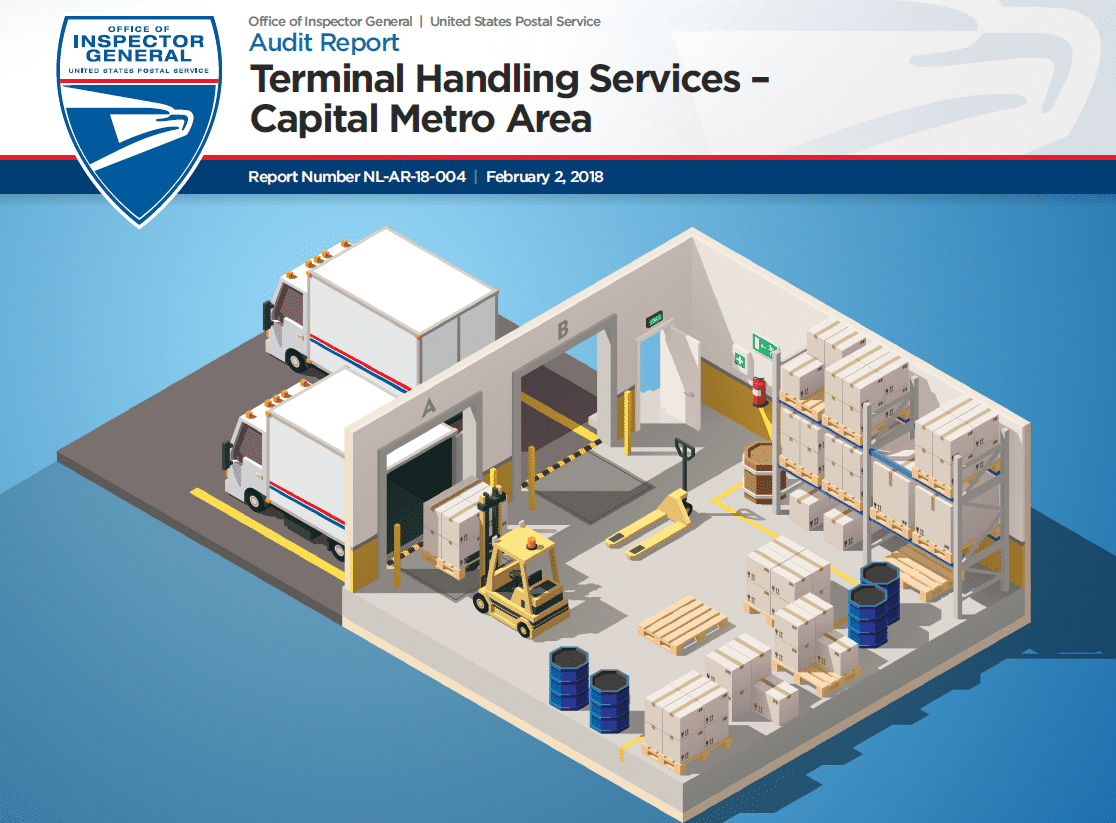
Objective
The objective of our audit was to assess the effectiveness of the Terminal Handling Services (THS) used to sort and transport mail for the Postal Service in the Capital Metro Area.
The Postal Service uses THS suppliers to load mail into FedEx air containers and deliver them to FedEx for transportation across the nation. THS suppliers also transport incoming FedEx air containers to THS facilities and load mail from the containers into mail transport equipment containers for Postal Service pick-up and delivery to designated mail processing facilities.
There are eight THS facilities in the Capital Metro Area and an additional 61 nationwide. The annual cost for the FedEx contract is about $1.6 billion and THS contracts over their contract terms total over $361 million.
What the OIG Found
We found that the effectiveness of the Capital Metro Area THS could be improved with better Postal Service oversight of mail arrival profiles and THS contractual operations.
During our Atlanta, Baltimore, and Charlotte site visits we observed:
- Postal Service mail processing facilities did not always adhere to the mail volume arrival profile (VAP) for the three THS sites. The VAP is a predetermined mail volume percentage sent from mail processing facilities to THS sites. The headquarters Manager of Logistics said they are aware of VAP mail arrival issues and are establishing national control centers to monitor processed mail volumes to ensure compliance with the VAP. When facilities do not comply with the VAP, there is an increased likelihood that mail will miss its FedEx flight. As an example, in fiscal year (FY) 2017, almost 29,000 pounds of mail missed scheduled FedEx flights for the Atlanta, Baltimore, and Charlotte THS facilities because of non-compliance with VAP. This increases the risk of mail processing delays for the Postal Service and its customers.
- Atlanta and Charlotte THS suppliers did not always meet the required mail delivery time to FedEx. This occurred because of a lack of adequate THS staffing and mail not always being loaded into air containers in a timely manner. Although we observed missed delivery times, they did not result in air containers missing their FedEx flights. However, missing delivery times can increase the likelihood of missed flights.
- The Atlanta THS did not always meet delivery time to the Postal Service for mail coming from FedEx flights. This occurred because the mail processing facilities did not provide the necessary transportation in a timely manner. This increases the risk of mail processing delays for the Postal Service and its customers.
- The three THS suppliers we observed did not always load mail into air containers according to the THS contract. The THS staff decided, without Postal Service direction, to load mail based on their preference instead of by contract requirement. As a result, the Postal Service paid FedEx for unplanned mail sorting charges. In FYs 2016 and 2017, the same THS suppliers caused the Postal Service to pay unplanned mail sorting charges of over $430,000 and over $372,000, respectively.
- The Baltimore THS supplier incorrectly sorted incoming packages and sacks from FedEx during our site observations. This occurred because the Baltimore THS staff did not use placards to identify the correct containers. Our analysis showed about 14,000 out of over 312,000 mailpieces were sent to the wrong mail processing facilities during our observations, which results in additional transportation for the Postal Service to retrieve and deliver the mail to the intended mail processing facility.
We concluded that the conditions we observed occurred because the Postal Service did not have adequate THS contractual oversight.
- Postal Service representatives are supposed to coordinate operations, monitor performance, and ensure proper management of THS contracts. However, the Postal Service staff at the Atlanta, Baltimore, and Charlotte THS facilities did not know what authority they had to enforce the contract and had minimal understanding of THS operations.
- THS suppliers self-reported contract performance irregularities that have liquidated damages. However, the Postal Service has not collected any monetary damages. In 2017, the Atlanta, Baltimore, and Charlotte THS suppliers reported four irregularities totaling over $3,600 that were not collected. The Manager of Air Transportation told us they are finalizing an automated THS supplier irregularity tracking and collection process but have not determined an implementation date.
- Contract liquidated damage assessment formula for failing to load is inconsistent with the liquidated damages definition. According to the contract, a liquidated damage would be assessed for all mail not loaded into air containers according to the contract. The assessment formula limits the liquidated damage to only mail that misses the FedEx flight.
Based on the THS contract, we estimated liquidated damages for failure to load and mis-routed mail that were never charged to the THS supplier and owed to the Postal Service could be over $5.1 million for FY 2016, and over $4.3 million for FY 2017 for the Atlanta, Baltimore, and Charlotte THS suppliers. If management does not correct the oversight issues, we estimated sorting costs and liquidated damages of over $5.2 million in FY 2018 and over $5.4 million in FY 2019.
What the OIG Recommended
We recommended management:
- Resolve mail processing facilities’ lack of adherence to the VAP for all Capital Metro Area mail processing facilities.
- Ensure that THS suppliers are not loading bypass mail into mixed mail air containers without approval at all Capital Metro Area mail processing facilities.
- Ensure the Baltimore THS supplier is using the required mail transport equipment container placards.
- Develop and implement a training program for all THS on-site Postal Service representatives to ensure they understand their contractual authority.
- Resolve the conflict between the failure to load contract requirement and the liquidated damage assessment formula, finalize the automated THS supplier irregularity collection process, and determine and collect all outstanding contractual liquidated damages.
